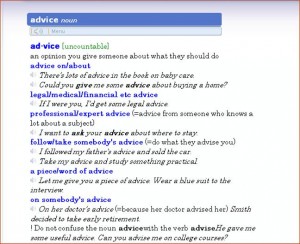The next question, “How do I know if a noun is countable or uncountable?”, is similarly not easy to answer!
We’re speaking about English, remember?
It’s time to take out our dictionaries – hard-bound, soft-bound, or electronic.  We will be using an online version, from Longman’s Dictionary of American English.
We will be using an online version, from Longman’s Dictionary of American English.
We’ll begin with an easy noun: the noun, advice. You can click on the hyperlink or you can see below:
This noun has one definition, and right away the dictionary listing says [uncountable].
That was easy. So now we know that this noun has NO plural form and that the verb we use should be in a singular form. We also know to NOT use an article (a and an) before this noun.
So how do we count this noun, then? How do we quantify it? Look at the example “a piece/word of advice“. This would be the standard way of counting items of advice.
Just yesterday a friend offered me some advice that I did not solicit. I said to her, “Did I ask you for advice?” She said “No” and that part of the conversation ended, and the topic was changed. Thus, grammatically, you see there was no article (a or an) used before the noun, which is correct for an uncountable noun.
Be sure, with looking up any word, in particular a noncountable noun, to see if the dictionary gives you any suggestions for how to quantify this noun.
We’ll stop here for today, at this easy place.
Yes, but there IS confusion. I head people talk about ‘futures’, ‘imaginations’, ‘pasts’, etc. and many others, all of which I used to have to teach as uncountables. So what is the solution and where is there a reliable list?
Jeannie,
There is no one list. Every noun in the English language has its own usage and history. Only a dictionary will tell you if this noun has meanings that would indicate this word used in this meaning is a count noun, and this word used with a different meaning would be a non-count noun. Reading good writing will help you to learn these usages, and also using a dictionary will help.
In the examples you give above, these nouns are concept nouns. We understand that concept nouns are not composed of discrete units and therefore cannot be counted (one, two, etc.). That does not, however, mean that they do not have a plural form. A dictionary can unlock the key to this. Whether you use singular or plural depends on the context.
The word “imagination” for example, is indicated as being both countable and uncountable, depending on the use. On that link, one example uses the quantifier “much” which is correct for a noncountable noun. At the same time, you will also see a plural form “imaginations” when referring to the imaginations of children: Each child has his/her own imagination, so the concept noun “imagination” can be used in the plural form when referring to the imaginations of children.
I think you can do the same thing with the two other concept nouns you provided. So you can see that each word is unique and though that’s the challenge of English, that’s also the beauty of mastering it.
If you see a specific example you’d like to ask about that uses the noun in a sentence, please share that with us and we can discuss that.
Thank you for your question – and hang in there!
Jane